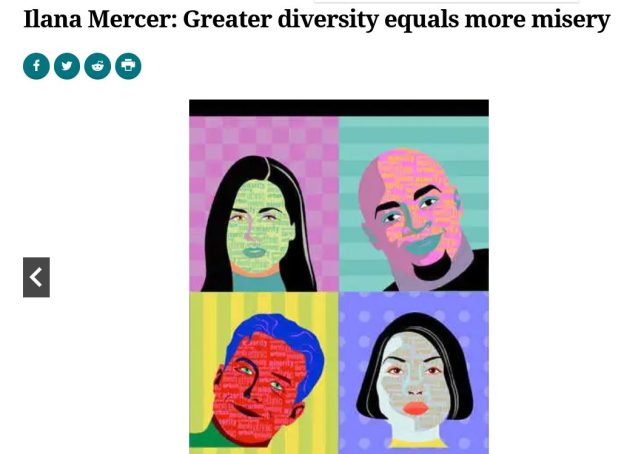When an academic discovers what ordinary mortals have known for eons, it’s called social science. Harvard political scientist Robert Putnam has found that diversity is not a strength, but a weakness; the greater the diversity in a community, the greater the distrust. Prof. Putnam’s five-year study was reported last year by the Financial Times, and is finally percolating down to others in the media and blogosphere.
In diverse communities, Putnam observed, people “hunker down”: they withdraw, have fewer “friends and confidants,” distrust their neighbors regardless of the color of their skin, expect the worst from local leaders, volunteer and carpool less, give less to charity, and “agitate for social reform more,” with little hope of success. They also huddle in front of the television. Activism alternates with escapism, unhappiness with ennui.
Trust was lowest in Los Angeles, ‘the most diverse human habitation in human history.'” Since this is all very perplexing to the “progressive” Putnam, who hangs out at Harvard, allow me to save the good professor from another future shock. People are doing more than hunkering down in these unhappy habitations; they are fleeing. In 1995, the New York Times mocked the findings of William H. Frey and Jonathan Tilove, authors of “Immigrants in, Native Whites Out.” These demographers noted that as states stretching from California to Texas were swamped by Third World immigrants, the historic population began leaving. At least those who did not reside in $16.5 million mansions, in the exclusive Pacific Heights. At its most elevated, the NYT discounted the findings with the aid of the correlation-is-not-causation claim. At its most debased, the newspaper called those who tracked the trend xenophobes.
Almost as predictable is the manner in which these straightforward, sad findings are being misconstrued by puzzled pundits or pressure groups accustomed to maligning You Know Who. The Commission for Racial Equality hasn’t heard a word Putnam has said. “Separateness is becoming more entrenched in parts of our society,” they warn ominously, as they rededicate themselves to “encouraging people from different communities to meet and understand one another.” Putnam said nothing about a lack of understanding or roiling conflict. Diversity triggered not racial hostility but “anomie or social isolation,” as he puts it.
Writing for City Journal about the sad settings Putnam excavated statistically, John Leo also introduces an error: “Social psychologists have long favored the optimistic hypothesis that contact between different ethnic and racial groups increases tolerance….” Putnam said nothing about intolerance. If anything, he makes it abundantly clear that he found no evidence of “bad race relations, or ethnically defined group hostility.” Rather, diversity generates withdrawal and isolation. The thousands surveyed were not intolerant, bigoted, or even hostile; they were merely miserable. This is mass depression, the kind that stems from loss, resignation, and hopelessness.
So too does Tammy Bruce mangle Putnam. Formulaically, she fingers multiculturalism and a failure to assimilate. Again, this is not what Putnam has unraveled. He says nothing about whether newcomers in the 41 localities studied across the US fly Old Glory, recite the Pledge of Allegiance, or are proficient in English (an impossibility if the non-English speaker immigrated in adulthood)—or whether these matter at all. He merely examined the impact on trust and sociability of racial and ethnic diversity, only to find that it messes equally with men, women, conservatives, liberals, rich and poor alike. (He does concede that “the impact of diversity is definitely greater among whites,” but, predictably, fails to dignify the finding.) There is nothing in Putnam’s research to implicate assimilation or lack thereof.
Like all social scientists living in symbiosis with statists, Putnam doesn’t confine himself to observations; he offers recommendations. Having aligned himself with central planners intent on sustaining such social engineering, Putnam concludes the factual gloom-and-doom with a stern pep talk. Take the lumps of diversity without complaining! Mass immigration and diversity are, overall, good for the collective. (Didn’t he just spend five years demonstrating the opposite?)
To sum, a scientist-cum-policy wonk “uncovers” patterns of co-existence among human beings that are as old as the hills. Greater diversity equals more misery. Does he respect these age-old peaceful preferences? No. Instead, with all the sympathy of a social planner, he reaffirms the glories of forced integration, and recommends dismantling old identities and constructing new, “shared” ones. (Or else!)
Putnam also pelts us with utilitarian platitudes. Evidently, the ethnic engineering historic populations have suffered at the hands of soviet-style planners dwarfs compared to the long term benefits of mass, Third-World immigration. The many thousands of miserable individuals Putnam interviewed must soldier on, their pursuit of happiness sacrificed for the collective gains of cheap Tyson chicken and colorful cuisine.
©2007 By Ilana Mercer
WorldNetDaily.com,
June 29.
A succinct version of this column appeared on Free-Market News Network, in the Colorado Springs Gazette (July 18: “Political Scientist Ignores Effects of his Own Research”) & in the Orange County Register (July 22: “Greater Diversity Equals More Misery“). The Boston Globe’s Michael Jonas quoted it, too, in “The Downside of Diversity.”
CATEGORIES: Diversity, Immigration, Multiculturalism, The State & Statism

 print
print